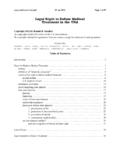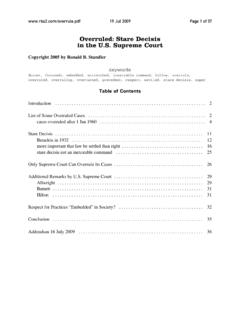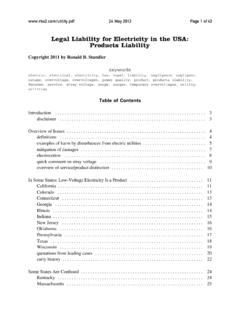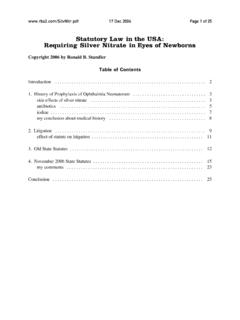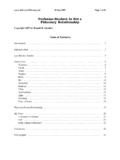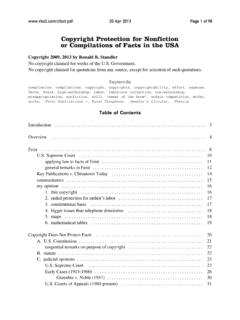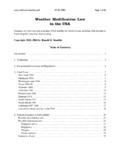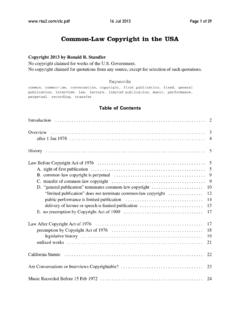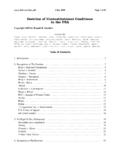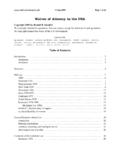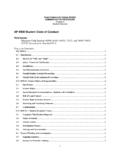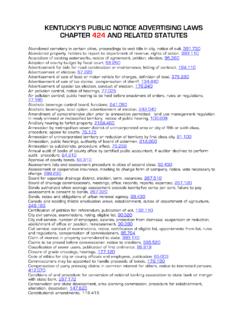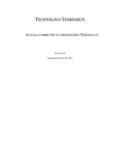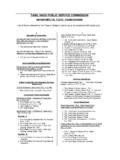Transcription of Ghostwriting and Plagiarism by Attorneys and …
1 6 May 2011 Page 1 of 93. Ghostwriting and Plagiarism by Attorneys and Judges in the USA. Copyright 2011 by Ronald B. Standler keywords attorney , Ghostwriting , ghostwritten, ghost-writing, ghost writing, judge, judicial, law, law clerk, lawyer, legal, Plagiarism , plagiarist, plagiarization, plagiarize, plagiarized, plagiary Table of Contents Introduction .. 3. definitions .. 4. disclaimer .. 5. Ghostwritten Speeches & Books by Politicians .. 5. Contracts and Complaints .. 7. Contracts .. 7. Copyrightability of Contracts .. 8. Complaints .. 11. both Contracts and Complaints .. 12. self-plagiarization .. 12. cases .. 13. Briefs .. 16. cases with a plagiarized Brief .. 17. my comments .. 20. Ghostwriting by associates .. 20. attorney Ghostwriting for pro se litigant .. 22. cases in Courts of Appeals .. 22. cases in trial courts .. 25. Johnson (1994) .. 26. other cases .. 27. discussion of Ghostwriting for pro se litigant .. 30. 1. pro se litigant held to less stringent standards in pleadings.
2 31. 2. rules of professional responsibility .. 33. 3. Rule 11 .. 33. possibility that a pro se litigant plagiarized .. 36. my recommendations .. 37. 6 May 2011 Page 2 of 93. Judicial Plagiarism .. 38. A. judicial copying from Briefs .. 38. B. cases .. 40. Morgan v. (1936) .. 40. v. Botany Worsted Mills (1939) .. 42. Dorsey v. Kingsland (1949) .. 43. Richard Posner's dissent (1984) .. 45. Judge Brennan (1989) .. 46. Florida (2006) .. 47. Judge Tesmer (1998) .. 48. Switzer v. Coan (2001) .. 49. C. Law Requires Impartial Decisionmaker .. 51. Judicial Oath of Office .. 51. Conflict of Interest Statute .. 52. Due Process .. 53. Judicial Code of Conduct .. 54. my comments .. 55. Law Clerk Ghostwriting Judicial Opinion .. 56. rare judicial thanks to law clerk .. 57. Parker v. Connors Steel (1988) .. 63. attorney Ghostwriting Judicial Opinion .. 66. A. federal court: ghostwritten findings of facts .. 66. Crescent Amusement ( 1944) .. 66. Louis Dreyfus (1962).
3 67. El Paso ( 1964) .. 68. highly technical issues (1965-73) .. 69. Marine Bancorp ( 1974) .. 71. Keystone Plastics (1975) .. 71. Holsey v. Armour & Co. (1982) .. 72. EEOC v. Federal Reserve Bank Richmond (1983) .. 73. Anderson ( 1985) .. 75. B. federal court: ghostwritten opinions .. 76. Chicopee Mfg. (1961) .. 76. Wisconsin Steel (1985) .. 76. Colony Square (1987) .. 76. Dixie Broadcasting (1989) .. 77. Bilzerian v. Shinwa (1995) .. 77. Bright (2004) .. 78. Living Designs v. Dupont (2005) .. 78. 6 May 2011 Page 3 of 93. Walker (2008) .. 79. C. state courts .. 79. Iowa .. 79. Minnesota .. 80. other .. 81. ghostwritten judicial opinion in state court .. 82. D. my view .. 83. Ghostwriting findings of facts .. 83. Ghostwriting conclusions of law .. 85. Ghostwriting entire opinion .. 85. Conclusion .. 86. summary of issues .. 86. general lack of discussion .. 87. plagiarization by lawyers .. 88. plagiarization by judges .. 89. attorney Ghostwriting judicial opinion.
4 90. my suggestions for judicial codes of conduct .. 90. rules are different for students .. 91. Bibliography .. 92. Introduction In June 2007, when I was revising my earlier essay Plagiarism in Colleges in the USA at I became aware of a few articles in legal journals that mentioned routine Plagiarism by practicing Attorneys and judges. Since 1990, several law professors suggested that such routine plagiarization by practicing Attorneys was confusing law students about plagiarization in law In her article, Prof. Yarbrough challenged the legal community: If using the thoughts or words of another without attribution is permissible in some instances but not in others, then legal professionals have an ethical obligation to articulate the differences. Marilyn V. Yarbrough Do As I Say, Not As I Do: Mixed Messages for Law Students, . 100 DICKINSON. LAW REVIEW 677, 683 (Spring 1996). However, in her seven-page article, she did not address the different styles in different kinds of legal documents.
5 1 Kevin J. Worthen, Discipline: An Academic Dean's Perspective on Dealing With Plagiarism , . 2004 BRIGHAM YOUNG UNIVERSITY EDUCATION AND LAW JOURNAL 441, 443-444 (2004) (Students assert, In my summer clerkship, lawyers borrowed phrases, sentences, forms, entire sections of briefs from one another without attribution all the time. Why all the fuss? Isn't this something that will be a non-issue the day I graduate?' ). Also see other articles cited in the bibliography, beginning at page 92. 6 May 2011 Page 4 of 93. Prof. Yarbrough says we need to clean up our own house. 2 Unfortunately, 15 years later, the task of articulating rules for practicing Attorneys and for judges apparently has not yet begun. I hope by posting this essay publicly at my website, I can encourage Attorneys and judges to evaluate their own practices and begin any reforms they believe are necessary. As I did research on the topic of Plagiarism by Attorneys and judges, I became aware of a larger problem: Ghostwriting by Attorneys and judges.
6 I was tempted to write two separate essays, one on Plagiarism and one on Ghostwriting , to clearly separate different kinds of conduct. However, Plagiarism and Ghostwriting are related, and discussing one of them can illuminate the other. There are several purposes of this essay. I began with the intent of discussing Plagiarism by practicing Attorneys for the benefit of law school faculty, like Prof. Yarbrough, who are grappling with Plagiarism in law schools. Second, the same information can be used to amend the rules of civil procedure and/or the rules of professional responsibility for Attorneys . Third, the same information can be used to amend the rules of judicial conduct. It is a misuse of this essay to use my legal research and analysis in any attempt either to criticize the entire legal profession or to criticize the judiciary. The focus should be on amending the rules to forbid Plagiarism and Ghostwriting , and not on criticizing professions or individual people who comply with the rules as written.
7 Currently, the rules of professional responsibility for Attorneys and judges are silent on Plagiarism and Ghostwriting . I have made some specific suggestions in the conclusion of this essay, beginning on page 86. Please suggest to the relevant authorities specific improvements to the rules for Attorneys and judges, instead of simply complaining. definitions Plagiarism and Ghostwriting are related kinds of conduct, in which the true author's name is concealed. The distinction between Plagiarism and Ghostwriting is: (1) A plagiarist copies text without the permission of the true author. (2) A ghostwriter knowingly and willingly produces text to appear as someone else's speech or writing. A plagiarist does not pay the true author for his/her services, while a ghostwriter is nearly always paid for his/her work. 2 Marilyn V. Yarbrough Do As I Say, Not As I Do: Mixed Messages for Law Students, . 100 D ICKINSON. L AW R EVIEW 677, 683 (Spring 1996).
8 6 May 2011 Page 5 of 93. disclaimer This essay presents general information about an interesting topic in law, but is not legal advice for your specific problem. See my disclaimer at . I list the cases in chronological order in this essay, so the reader can easily follow the historical development of a national phenomenon. If I were writing a legal brief, then I would use the conventional citation order given in the Bluebook. Because I am not under any limitation on the number of pages, I have included longer quotations from court cases than typical writing for Attorneys , to make it less necessary for the reader to look at the source of the quotation. Ghostwritten Speeches & Books by Politicians Major politicians, including both candidates for president of the USA and the president himself, hire ghostwriters to write speeches, which are displayed on a teleprompter for the politician to read during the speech . The speech is not a spontaneous speaking to the audience, but a carefully scripted event in which most of the words were actually written by an anonymous ghostwriter.
9 This practice is not copyright infringement, because the written employment contract for the ghostwriter should specifically say that the writer's words are a work made for hire as that phrase is understood in the copyright law. I'm sure that politicians would respond to this criticism of them by saying that they are too busy to write and polish speeches, particularly when they may deliver several new speeches in each week. But that excuse sounds like the student who says he was forced to plagiarize because he waited until the night before the term paper was due to begin work on the term paper. The same analysis applies to books that are allegedly written by a prominent politician or other famous personality, but are actually written by a hired ghostwriter. As Prof. Lastowka said,3 this is a legal and voluntary transaction, in which the writer agrees to be anonymous and invisible, in exchange for payment for writing services. However, I believe it is at least arguable that the alleged author has perpetrated a fraud on the public, in that the alleged author receives credit and praise for a book he/she did not write.
10 In my view, ghostwritten books are a despicable practice. In my opinion, the ghostwriter should be named as co-author (or author) of the book, which ends the practice of ghostwritten books. 3 Greg Lastowka, The Trademark Function of Authorship, 85 BOSTON UNIVERSITY LAW. REVIEW 1171, 1222 (Oct 2005). 6 May 2011 Page 6 of 93. As with Plagiarism , there are two factors to consider in evaluating Ghostwriting : (1) the amount of text that was ghostwritten, and (2) the value of the ghostwritten text to the alleged author. Small amounts of ghostwritten text is de minimis, unless the sentences are frequently quoted by journalists or commentators. Ghostwritten text that is published in a book has a higher value than ghostwritten text that is read during a speech in a small town and then forgotten. One might also question whether the Ghostwriting contract is really voluntary. The ghostwriter may be an unemployed person who was an English major in college, with limited employment opportunities.
